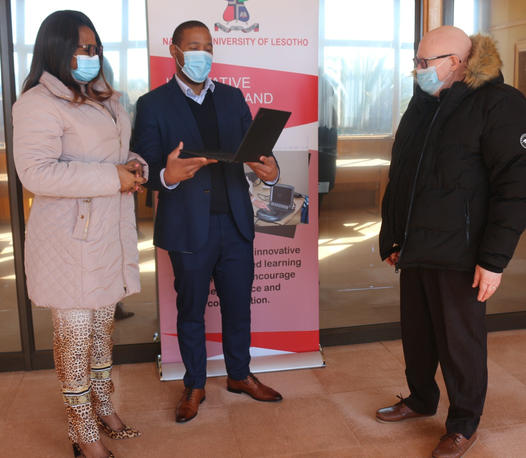You take a plant you know nothing about and have never seen before to this robot. It takes a “look” and tells you right away, “ah, nah, this is Mofahlana.” It can even tell you the Scientific or English name of Mofahlana, “well, this is, uuum, Tarchonanthus camphorates.” Not only that, the robot will give you one or two lessons about the plant, “Basotho use this plant for flu and aching teeth but wait a minute, don’t overhaverst it. It is in danger of getting wiped off.” Two National University of Lesotho (NUL) Students; Thato Sefoloko and Thato Malitse, are developing the robot. ______MILCO is a chainstore that will sell ONLY Made In Lesotho Products. Join Milco here: https://milco.co.ls/Member_register The students hope that that among other things, this robot can be used in Lesotho’s Tourist attractions at some point. This is how. Suppose tourists are hiking through a woodland, rich with indeginous vegetation, like the proposed ‘Mamathe Wonderland by Ha ‘Mamathe Community and the NUL Innovation Hub [mamathe.co.ls]. They can be encouraged to inspect plants along the way and, more importantly, how these plants are traditionaly used as medicine by Basotho. Think of these tourists taking a six hour hike though Mamathe Wondeland with phones in their hands. Each phone has a robotic app. Whenever they see a plant of interest, they take a picture and oops! The robot starts telling them stories, “well, this plant is called “Mosali-mofubelu” in Sesotho, which literally means a reddish woman. Scientists like to call it Cassinopsis ilicifolia. Whereas we don’t seem to use it that much as Basotho (this is a Mosotho robot), it would appear our beloved Eastern neigbours, the Zulus, use it for treating stomach ailments like diarrhoea.” If the robot doesn’t quite know the plant, it will give you a list of plants that are similar so you can choose if some of them are relatives of the plant you are holding or even match it. No doubt you can already appreciate that this robot can be used by almost anyone who loves and wants to explore nature in a fun way: the scientists, the students, the children you name it. Both of these guys are Computer Science students and they are fascinated by the propects of using Artificial Intelligence in Lesotho in almost all areas of life, “how we wish Artificial Intelligence could be given the attention it deserves by our society,” they lamented! “If only people knew how powerful it is!” They are both supervised by Messrs Sekese Molete and Balone Ndaba. At one time, the two were worried about whether robots could differentiate between identical twins. “We were like, could they say if this one is Tlali and that one is Tlalinyane?” The reason we call them identical twins is because, ya, they look very much like one person, sort of. But they are different too, that’s why we give them different names. So the students used the same reasoning with plants but in reverse. Can robots be able to see one plant and say, “oh, yah, I kind’a think I know this plant, it must be….so and so” on the basis of what it knows about similar plants it saw before? That’s how we experience life as humans and robots are supposed be like us…not exactly like us…but close. Normally, we as humans will somehow learn how a rose looks like by identifying its specific features (even if we are not thinking about it). So when we come accross another rose, we know it is a rose because it has features similar to the rose we already know. That’s why we invented the saying, “if it looks like a duck, swims like a duck, and quacks like a duck, then it probably is a duck.” That’s the principle the robot uses. What these folks do is that they create and train the robot like they do a child. “A child is trained by repetition,” they said. As they explained this, it was as if they were qouting from the Biblical book of Deutronomy 6:6-7, “these commandments that I give you today are to be on your hearts. Impress them on your children. Talk about them when you sit at home and when you walk along the road, when you lie down and when you get up.” As with children, where you will have to say the same thing in many different ways until it registers, the robots need you to feed it pictures of the same plant again and again and in its many forms until it can recognise the plant. “Be careful though,” they warned, “just as you don’t want to overload your child with too much repetition, you also don’t feed the robot too much information because, well, it can get pissed off sometimes.” When it does, it goes crazy and starts loosing accuracy to predict. ______MILCO is a chainstore that will sell ONLY Made In Lesotho Products. Join Milco here: https://milco.co.ls/Member_register


